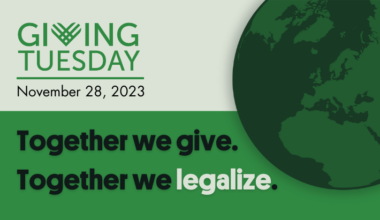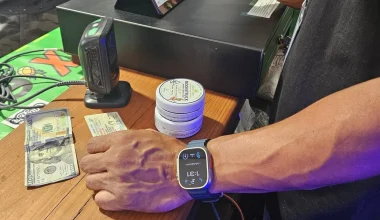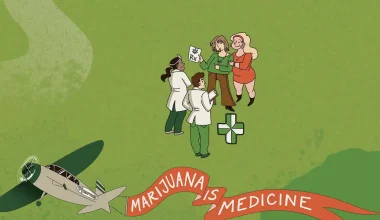The following blog post was drafted by longtime NORML activist Chris Goldstein.

Three years have passed since New Jersey police stopped making mass arrests for marijuana possession offenses. Today, more than 100,000 people of all ages have avoided being handcuffed over small amounts of weed.
Our community of consumers and medical patients, who fought for decades to win these cannabis reforms, gathered at the State House in Trenton on Thursday. We were also joined by some of the newest permit holders.
Activists united on the occasion to celebrate progress while also urging lawmakers to address unfinished business, specifically, the need to permit home cultivation, expand record expungements, and build a more robust medical access program.
Evan Nison, the Vice-Chair of National NORML’s Board of Directors, was one of the 2020 ballot question organizers. He noted that eliminating low-level arrests was an important first-step.
“I’m very glad to see those days behind us,” said Nison, “Possession arrests were one of the most egregious aspects of prohibition and that’s why today is a cause for celebration.”
Matha Figaro, the CEO of CannPowerment and now a licensed Class-2 NJ cannabis manufacturer, said “As a minority woman, and truly a legacy to legal operator, I can say that today’s milestone in New Jersey reflects a significant shift in our societal values towards inclusivity and justice. It’s crucial for legal cannabis business operators to continue to push forward on comprehensive reforms like clear records and personal cultivation.”
Josh Alb, a minority industry expert from Cannademix, said that permitting retailers to sell clones should be a legislative priority. “Home cultivation really is necessary for the growth of the industry and it offers an entirely new economy. Personal gardens also allow for the legal supply chain to actually work hand-in-hand with patients by providing the most effective genetics directly from dispensaries.”
Dozens of newly licensed small-business cannabis operators have now joined activists in the call for home cultivation.
The Long Road
Prior to 2021, police in New Jersey were arresting about 100 people every day for simple marijuana possession. This total was more than for all other substances combined. The harsh racial disparities accompanying this enforcement had persisted for decades.
In 2018, state Attorney General Gubir Grewal issued a memo recommending that marijuana prosecutions be suspended; nonetheless, police still kept up the draconian pace of arrests.
When Governor Phil Murphy signed the flight of historic reform laws on February 22, 2021, he also took the extra step of ordering an immediate stop to police interactions over a few grams of marijuana.
“Governor Murphy has been a fantastic leader in this regard and deserves to be commended,” said Nison, “It’s now our Senate President, Senator Scutari, who’s ignoring the work that still needs to be done.”
Voters Say Yes
In November 2020, more than 3 million voters went to the polls to say “yes” to the resoundingly successful ballot question about retail cannabis. The laws that were signed on 2/22/21 covered taxes and storefronts but also decriminalized marijuana possession along with low-level sales.
Andrea Raible saw too many people in the community suffer under prohibition, including unregistered medical patients caught in the crossfire.
“Opening more than 100 dispensaries rather than arresting 100,000 people for cannabis is a transformation worth celebrating,” said Raible, “We’ve made some long strides towards dismantling stigma, enabling sufficient access, and providing painfully overdue justice reform.”
Ken Wolski, a registered nurse and the Executive Director of the Coalition for Medical Marijuana New Jersey (CMMNJ), said that his group’s post-legalization goals include, “Personal cultivation and insurance coverage for patients along with cannabis access within hospitals, prisons and other institutions.”
Community Voices on Home Cultivation
New Jersey remains one of the few legal marijuana states that still prohibits home grows. Activists are united on the goal of ending this ongoing prohibition.
Voices from around New Jersey chimed in on the important issues of personal cultivation rights.
David L. Nathan, MD is an associate professor at Rutgers Robert Wood Johnson Medical School and a distinguished fellow of the American Psychiatric Association. He also co-founded Doctors for Drug Policy Reform (D4DPR) and helped organize NJ United For Mairjuana Reform (NJUMR) in supporting the 2020 ballot question.
“Banning our citizens from growing their own cannabis only perpetuates the harms caused by overzealous policing,” noted Dr. Nathan, “Just as black New Jerseyans are far more likely to be arrested for cannabis possession than their white counterparts, they would surely be disproportionately targeted for the simple act of growing a few plants for medical or personal use.”
Paul Davis, an expert on botanicals who owns Green Dragon Supply, said that legislators should avoid getting tunnel-vision on counting a few plants. Advocates agree that canopy sizes are a better solution.
“Listening to actual patients is the best way to move forward,” said Davis. “Cannabis plants for specific medicinal traits are found across a wide range of genetic expressions, and patients deserve the freedom to search for the right ones. Low plant counts will keep the majority of medical home growers outside of a narrow law, and they will continue to face all the risks of prohibition.”
Abigail Kalmbach, PhD, a neuroscientist at Barnard College, Columbia University and member of the CMMNJ, agrees that cannabis plants with different genetic expressions can form the basis of personalized medicines by addressing patient-specific needs.
“Unfortunately, patients are currently at the whims of operators who are motivated by market forces to grow plants with high- and quickly-producing yields instead of cannabis plants optimized for particular health conditions,” notes Dr. Kalmbach. “Patients deserve the right to grow their own plants to address their own needs.”
Edward “Lefty” Grimes and Adam Umansky help lead the 501c3 education group Sativa Cross. They’ve been keeping attention on access for patients with demonstrations and podcasts.
“We’ve made real progress here in New Jersey, but we still have a long way to go,” said Lefty. “Make no mistake, people are still being victimized and even disabled residents are being left out.”
Umansky noted, “We legalized marijuana almost 15 years ago in the name of compassion but we never got relief.”
Longtime medical cannabis activist Jim Miller is happy to see the lasting impact of stopping possession arrests, but wondered why some legislators have turned their backs on patients since then. “This is also the anniversary of one single legislator blocking home cultivation for three years,” said Miller, referring to Senator Scutari.
Gina Giorgio is an organizer with Students for Sensible Drug Policy (SSDP) who agrees that legislators should still be still looking ahead. “New Jersey has the opportunity to be a model for equitable health care and comprehensive drug policy reform,” said Giorgio. “We hope that Senator Scutari will prioritize the wellbeing of all NJ residents, but especially those who have been disproportionately affected by our tragic and unjust prohibition laws.”
Ryan Ems, the President of SSDP’s chapter at Rowan University, said, “We’re asking our legislators to pass Senate Bill 1393 and do right by the medical cannabis community.”
NORML’s Action Alert in support of S1393 has generated hundreds of communications seen to New Jersey legislators.
Udi Ofer is a civil rights advocate who worked with ACLU-NJ and helped co-found NJUMR. Today he teaches at Princeton University and is still looking forward to the next levels of cannabis reform.
“As we mark the first three years of legalization in New Jersey, now is the time to both celebrate its successes and reflect on lessons learned,” said Ofer. “Regulated cannabis products came with the promise of creating greater equity in our state, and reducing the damage caused by government policies that unfairly punished people for their individual choices. Three years in, we should ask ourselves: Have we achieved this goal?”
Information on Senate Bill 1393 and other pending legislation is available from NORML’s Take Action Center.
Related
Medical Disclaimer:
The information provided in these blog posts is intended for general informational and educational purposes only. It is not a substitute for professional medical advice, diagnosis, or treatment. Always seek the advice of your physician or other qualified healthcare provider with any questions you may have regarding a medical condition. The use of any information provided in these blog posts is solely at your own risk. The authors and the website do not recommend or endorse any specific products, treatments, or procedures mentioned. Reliance on any information in these blog posts is solely at your own discretion.





